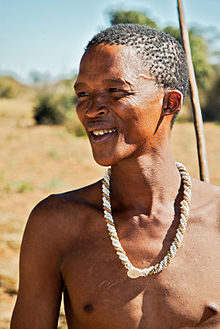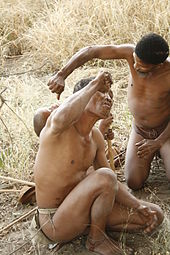How Startups can Survive the Drought and Find Investors
(from Are You Fundable?)
 All
Startups will endure "the drought" - when customers are scarce and
investors non-existent.The more you can successfully bootstrap the
company, the more you impress potential Investors. If you want to know
how to endure “the drought” and find the money, think of the Bushmen or San of the Kalahari Desert. They get rain during one season of year, and conserve what they can with little technology - for the rest of the time, as desert insiders, they know how to find water through alternative sources.
All
Startups will endure "the drought" - when customers are scarce and
investors non-existent.The more you can successfully bootstrap the
company, the more you impress potential Investors. If you want to know
how to endure “the drought” and find the money, think of the Bushmen or San of the Kalahari Desert. They get rain during one season of year, and conserve what they can with little technology - for the rest of the time, as desert insiders, they know how to find water through alternative sources.What if you are a newcomer - a Startup in the desert? How would you find water?
You do this by what might be called "Salting the Monkey." |
 |
| San drinking from a tuber |
How to “Salt the Monkey” to Find Money and Business
How would an Entrepreneur, stuck in this wilderness, tap the resources of the true insiders? Tribesmen from surrounding areas who find themselves in this situation use other animals like baboons to help them find these sources of water. They do this by trapping the baboons or monkeys and feeding them salt so they get thirsty enough to lead them to water.
 All it requires is
finding a monkey hangout, an anthill, some seeds (a shiny object works
too), twine and the aforementioned salt. First, the visitor makes a hole
in the cement-like anthill at about crouching height. Next, the visitor
appears near the monkey and plays with his seeds, making sure to get
its attention. With great showmanship that ensures the monkey observes,
he places his hand in the amply sized hole and drops the seeds. Then he
walks away. The monkey, being a highly curious creature, will head for
the anthill once the tribesman has left the scene put his hand in and
grab the seeds. However, in making the fist, the monkey finds the hole
is not big enough to remove his hand bulging with the seeds. Since the
curiosity of monkey so consuming, he cannot let go of the seeds - and so
he is trapped. He feeds the monkey the salt and soon enough the thirsty
creature leads him to an underground lake.
All it requires is
finding a monkey hangout, an anthill, some seeds (a shiny object works
too), twine and the aforementioned salt. First, the visitor makes a hole
in the cement-like anthill at about crouching height. Next, the visitor
appears near the monkey and plays with his seeds, making sure to get
its attention. With great showmanship that ensures the monkey observes,
he places his hand in the amply sized hole and drops the seeds. Then he
walks away. The monkey, being a highly curious creature, will head for
the anthill once the tribesman has left the scene put his hand in and
grab the seeds. However, in making the fist, the monkey finds the hole
is not big enough to remove his hand bulging with the seeds. Since the
curiosity of monkey so consuming, he cannot let go of the seeds - and so
he is trapped. He feeds the monkey the salt and soon enough the thirsty
creature leads him to an underground lake.Finding a champion in the desert and inspiring them enough so they lead you to the critical resource is they way every savvy Entrepreneur has launched their Startup.
http://bit.ly/1DNYIO4
